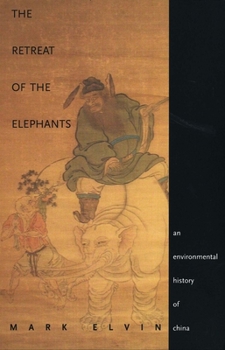The Retreat of the Elephants: An Environmental History of China
Select Format
Select Condition 
Book Overview
A landmark account of China's environmental history--by an internationally pre-eminent China specialist
This is the first environmental history of China during the three thousand years for which there are written records. It is also a treasure trove of literary, political, aesthetic, scientific, and religious sources, which allow the reader direct access to the views and feelings of the Chinese people toward their environment and their landscape.
Elvin chronicles the spread of the Chinese style of farming that eliminated the habitat of the elephants that populated the country alongside much of its original wildlife; the destruction of most of the forests; the impact of war on the environmental transformation of the landscape; and the re-engineering of the countryside through water-control systems, some of gigantic size. He documents the histories of three contrasting localities within China to show how ecological dynamics defined the lives of the inhabitants. And he shows that China in the eighteenth century, on the eve of the modern era, was probably more environmentally degraded than northwestern Europe around this time. Indispensable for its new perspective on long-term Chinese history and its explanation of the roots of China's present-day environmental crisis, this book opens a door into the Chinese past.
Format:Paperback
Language:English
ISBN:0300119933
ISBN13:9780300119930
Release Date:September 2006
Publisher:Yale University Press
Length:592 Pages
Weight:1.85 lbs.
Dimensions:1.6" x 5.8" x 8.2"
Customer Reviews
2 ratings
Not really about elephants, but fascinating just the same
Published by Thriftbooks.com User , 14 years ago
Mark Elvin's book is not really about elephants. The elephants are a symbol for the retreat of nature from China. What the book makes clear is that China's environmental disaster is not a product of the 20th century, but dates back thousands of years when the early dynasties stamped out a culture of hunter-gathering in favor of agriculture and engaged in a deliberate destruction of flora and fauna for economic and political gain. Early Chinese dynasties were damming rivers and carving away mountains long before Mao tse-tung expounded his theories man conquering nature, the Chinese were damming rivers and carving away rivers. The book is not complimentary of Han Chinese culture's attitudes towards the environment. Elvin makes clear that other ethnic groups had more interest in maintaining harmony between man and nature. The research that went into this book is impressive. Elvin quotes extensively from literary sources and even oracle bones to explore Chinese attitudes towards nature. The book doesn't dwell much on what happened after China's economic boom in the late 20th century, but nonetheless goes a long way towards explaining why the Chinese landscape looks the way it does today.
new angle to understand China
Published by Thriftbooks.com User , 18 years ago
This is a landmark book on environmental history that is well-received by many academics (also check out other reviews on the web). For me personally, this books helps me understand today's China's problems better than many other books I've read. It maybe a stretch for people that to understand today's China, you need to go back to its 3000 years of environmental history. However, this book offers many potential answers to many questions that are still relevant today - e.g. Is China's growth sustainable? Why Chinese people have such relationships with their government? Where does her seemingly in-exhaustible labor pool come from? The book illuminates the constant struggles between the Chinese population and her environments throughout her 3000 years of written history, with the Chinese state often being the driving force and the subsequent victim when nature eventually fought back. Many such struggles are still being repeated today - for example, the recent push of China to develop its north-west region resembled the same push Chin/Han dynasties started from 300 BC, which resulted in permanent soil erosions that gave yellow river its name and caused numerous disasters downstreams since. The Three Gorges Dam is an extension to the long running tradition of massive state-sponsored hydro-projects trying to control the river in the name for "growth". The list goes on and on... History is bound to repeat herself if we ignore her. Hopefully this books will not be ignored.





